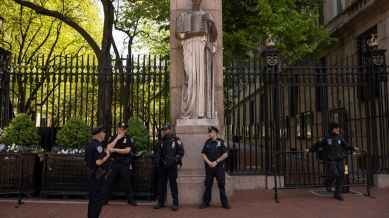Stay updated with the latest - Click here to follow us on Instagram
Under pressure from Trump, Columbia University agrees to policy changes in attempt to restore funding
The decision has sparked criticism from faculty and free speech advocates, who argue that Columbia has given in to an unprecedented level of government interference in academic freedom.

Columbia University which is under the Trump administration’s scanner has agreed to implement policy changes in its disciplinary process, and how it runs departments that offer courses on the Middle East before it can negotiate to regain federal funding.
Earlier this month, the Trump administration froze $400 million in research grants and other funding, citing concerns over how the university handled protests against Israel’s military action in Gaza. To restore this funding and secure future grants, the federal government demanded Columbia immediately implement nine key reforms to its policies on academics and campus security.
“Columbia’s capitulation endangers academic freedom and campus expression nationwide,” said Donna Lieberman, executive director of the New York Civil Liberties Union, in a statement.
The decision has sparked criticism from faculty and free speech advocates, who argue that Columbia has given in to an unprecedented level of government interference in academic freedom. The outcome could have broad ramifications as the Trump administration has warned at least 60 other universities of similar action.
What are the proposed 9 key reforms?
On Friday, Armstrong confirmed that Columbia would comply with nearly all of these demands. The university will change its disciplinary process and ban protests inside academic buildings. Students will also be prohibited from wearing face masks to conceal their identity, except for health reasons.
A new senior provost will be appointed to oversee several international studies departments to ensure “comprehensive and balanced” educational programmes. One of the most controversial changes is placing the Middle Eastern, South Asian and African Studies Department under “academic receivership” for at least five years, meaning it will be closely monitored and restructured.
“This is an escalation of a kind that is unheard of,” said historian Joan Scott, who is part of the academic freedom committee of the American Association of University Professors. “Even during the McCarthy period in the United States, this was not done.”
Columbia responds to criticism
The Trump administration has repeatedly accused Columbia of allowing antisemitism at protests against Israel that began on campus last spring and later spread to other universities.
In her letter, Armstrong defended the university, saying, “The way Columbia and Columbians have been portrayed is hard to reckon with. We have challenges, yes, but they do not define us.”
While Columbia has been the most high-profile target of Trump’s actions against universities, the administration has also warned other institutions that they could face funding cuts if they do not follow its policies. Last week, the government announced investigations into 52 universities over their diversity, equity, and inclusion programmes.
(with inputs from AP)